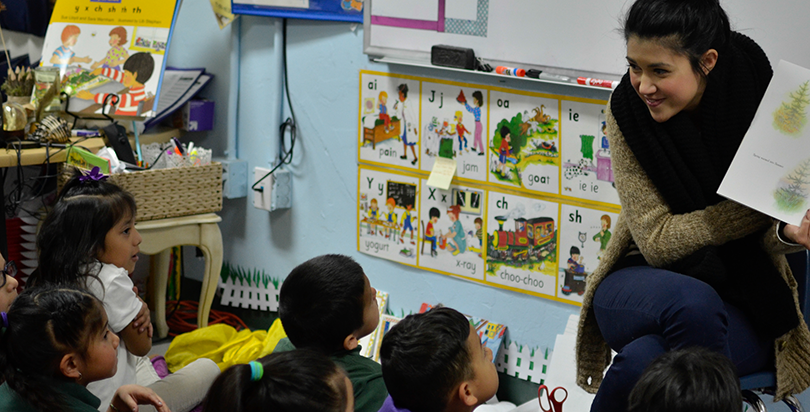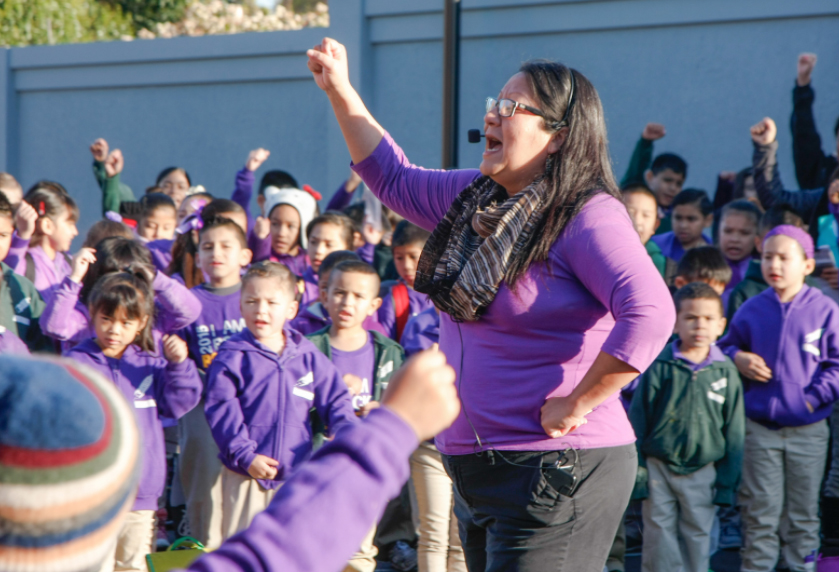Smith: 10 Lessons From Rocketship Education’s First Decade as a Pioneer of K-5 Personalized Learning

1. Personalized learning starts at home
We grabbed a lot of headlines as being one of the pioneers of personalized learning. We remain staunch advocates for the purposeful integration of technology to support student learning and promote student agency, but personalized learning is about much more than tech. It’s about a deep understanding of the unique needs and interests of every student and family. Our annual home visits have become an essential component of our personalized learning model. When we change the dynamic from a parent in a teacher’s classroom to a teacher in a student’s home, we develop much stronger relationships with our families and a deeper understanding of how to best serve each and every Rocketeer.
2. To change the system, we need to create more demand
Rocketship is focused exclusively on elementary education. Of course, a lot of parents, funders, and partners have encouraged us to build out a K-12 system. It’s definitely tempting. It’s hard to watch our Rocketeers leave us in fifth grade and wonder, What will become of their future? But for us, it comes down to the difference between trying to transform our public school system and building a parallel system. We believe a self-contained K-12 system undermines our ability to engage parents beyond the classroom and create parent demand for equity in public education. It’s what former U.S. secretary of education John King was talking about when he said, “We are investing something like 98 percent of our national philanthropy in supply, and at best 2 percent in demand, and we’re not seeing equity-focused systems change happen quickly enough.” We need to invest more energy in creating demand.
3. Honor the power of parents
We built our parent leadership program to help families exercise their power to demand political attention, hold leaders accountable, and enable high-quality public school systems to thrive. Because we offer only elementary education, parents must engage, organize, and advocate for high-quality middle and high schools — at least, that was our theory. Well, 10 years later, we’ve seen this movement take hold in San Jose, where Rocketship parents like Karen Martinez have helped open high-quality middle and high schools. We learned that if we truly want to scale to the size of the problem in public education, we need to focus on catalyzing movements for high-quality public education that puts parents in the driver’s seat.
4. Integrating students won’t create culturally responsive schools — teachers will
There has been a lot of chatter about charter schools and segregation lately, and much of it is off the mark. Parents from historically marginalized communities choosing a school because they believe it is in the best interests of their child is a far cry from the government prohibiting students from attending a school on the basis of their race. Rocketship Education welcomes all kids in our schools, regardless of ethnicity, race, class, or creed. We value diversity, but we don’t believe students of color should have to leave their community to attend a great school. Furthermore, there’s a different measure of school diversity that research shows is much more impactful to students of color: teacher diversity. We need to build new pathways into teaching to ensure our students experience the many benefits of teacher diversity. In Malcolm Gladwell’s investigation into Brown v. Board, he uncovers a powerful interview from an African-American teacher in Virginia who said, “The first people that should have been integrated was the teachers and administration.” She was right. And still is.
5. Actions speak louder than words
I didn’t have any children of my own when we launched Rocketship. Now I have two. Both my kids attend Rocketship Fuerza Community Prep. When my wife and I decided to enroll our kids in Rocketship, I wasn’t trying to make a statement; I just wanted my kids to go to a great school, as every parent does. And fundamentally, if our schools aren’t good enough for my own kids, how can I honestly say they are good enough for any kids? But I now realize the significance of that choice. It’s what Nikole Hannah-Jones writes about: “the hypocrisy of progressive people who say they believe in inequality, but when it comes to their individual choices about where they’re going to send their children, they make very different decisions.” It’s not a comfortable topic to discuss, but we need to confront it.

Rocketship schools start every day with a full school assembly called “Launch.”
6. Meaningful inclusion benefits all kids
In our early years, we struggled to develop a quality program to serve students with disabilities. Like most schools, we focused on compliance. But over time, we developed a program that we are deeply proud of. In our meaningful-inclusion model, the vast majority of students with disabilities spend 80 percent of their day in general education classrooms. The benefits to students with disabilities are clear. But inclusion also benefits typically developing students who develop greater empathy for the diverse needs in our school community. Don’t get me wrong — it’s hard to achieve. When a student with behavioral challenges is disrupting other students in a classroom, many parents’ first thought is to remove that student from the class. When we don’t, some parents get upset. But that’s a small price to pay for developing an entire school community that celebrates and helps all students as they discover and develop their remarkable potential.
7. Never stop learning
A few years ago, we tested a new approach that we called the flex model. The idea was to unleash the impact of excellent teachers by creating a dynamic, open learning environment guided by three teachers and one school leader. Some schools thrived with this model, but others did not. The lack of structure made it difficult to control quality, and when the pilot ended, we decided not to roll it out. But the flex model taught us about the critical impact of student agency, real-time coaching, and how to build an adult culture based on continuous learning, weekly goal setting, and actionable feedback. Those tenets have become a hallmark of our work today. We took a lot of heat for this pilot, but we are stronger for it.
8. Define your mindset
Building a culture of continuous learning may sound nice, but it is not for everyone. Not every educator wants a coach in the classroom every week. For some, it feels like they are constantly being judged, and they burn out quickly. We learned this lesson the hard way. So over time, we’ve honed our hiring practices to find educators with a mindset that better matches our model. Teachers who thrive at Rocketship are tenacious learners who embrace feedback and constantly strive to master their practice, no matter how many years of teaching experience they have. By adapting our hiring practices to evaluate mindset alongside skill, we are strengthening our adult culture and improving student outcomes.
9. You won’t go far trying to go it alone
We set some lofty goals for our growth when we launched 10 years ago. And while our moonshot may have helped draw attention to the massive size of the achievement gap, it grossly underestimated the complexity of growing a network of public schools that depends on a dizzying array of public agencies, from authorizing school boards to zoning commissions to bond-financing boards. Building strong, productive, and transparent partnerships with these stakeholders takes considerable time and attention, yet it is paramount to our collective success.
10. Proud to be a public school
Last spring, I was chatting with a couple of parents at my kids’ school. They were telling me what got them interested in Rocketship Education. They said, “Rocketship is like a private school, but free.” I get it. In a world divided by haves and have-nots, it’s a pretty clear pitch. But it doesn’t sit right with me. I remain a staunch advocate for public education. It’s the backbone of our democracy and the foundation of the American dream. Do we need to revitalize public education? Absolutely. But we can’t take the “public” out of our schools. We must wear it like the badge of honor that it is. Which is why we are making a small, but symbolic, change to our name. Rocketship Education is now Rocketship Public Schools.
Get stories like these delivered straight to your inbox. Sign up for The 74 Newsletter

;)
